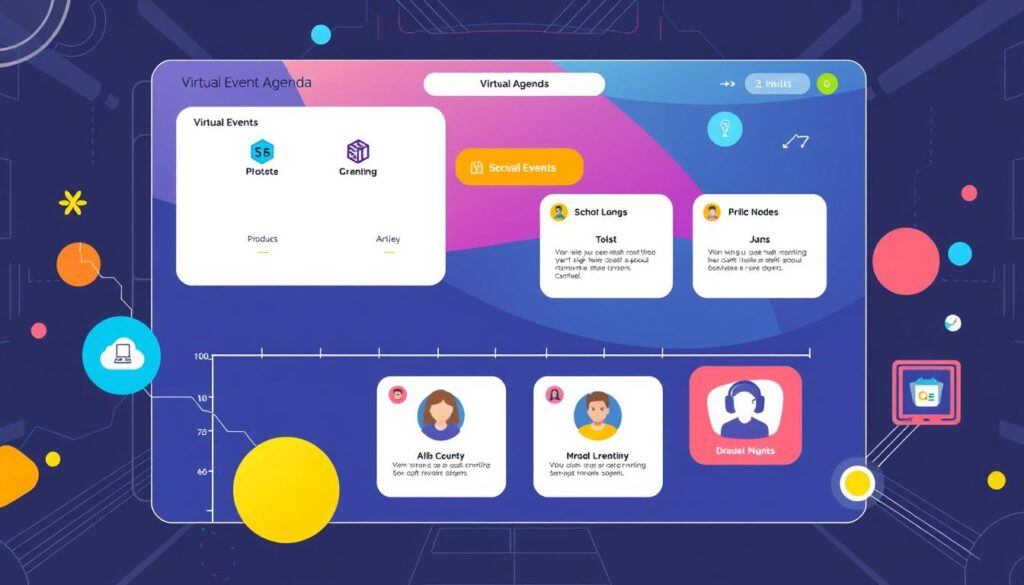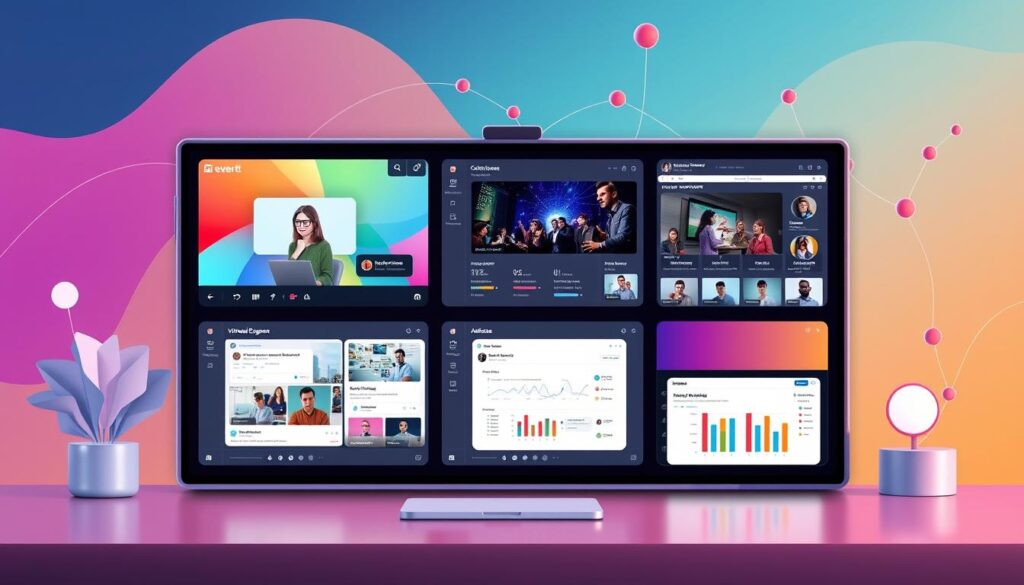העולם הדיגיטלי מחייב אירועים וירטואליים מרתקים. איסופים מרחוק מעודדים מעורבות, שיתוף פעולה וקהילה. מדריך זה מעצים ארגונים ליצירת חוויות מקוונות שלא נשכחות.
נחקור אסטרטגיות ליצירת אירועים וירטואליים מעניינים. תלמד לבחור את הפלטפורמה הנכונה ולקדם בצורה יעילה. נחלוק גם טכניקות לשמירה על תשומת לב של המשתתפים לאורך כל הזמן.
מסקנות מרכזיות
- להבין את המאפיינים המוגדרים והיתרונות של אירועים וירטואליים
- ללמוד אסטרטגיות ליצירת חוויית אירוע וירטואלי מעניינת
- לחקור את חשיבות בחירת הפלטפורמה הנכונה ל אירועים וירטואליים
- לגלות טכניקות יעילות לקידום ושיווק של אירועים וירטואליים
- ליישם אסטרטגיות למעורבות באירועים וירטואליים כדי לשמור על תשומת לב של המשתתפים
הבנת המהות של אירועים וירטואליים
אירועים וירטואליים הפכו לאלטרנטיבה עוצמתית לאירועים פנים-אל-פנים. הם מציעים מגוון יתרונות שמשנים את דרכינו להתחבר ולשתף מידע. החוויות המקוונות אלו חיוניות להתאמה לנוף האירועים המתפתח.
הגדרת אירועים וירטואליים
אירועים וירטואליים הם אירועים חיים ואינטראקטיביים באינטרנט המחברים אנשים ממקומות שונים. הם כוללים וובינרים, כנסים וירטואליים, סדנאות מקוונות ותערוכות מסחר וירטואליות. אירועים אלה משתמשים בטכנולוגיה כדי ליצור חוויות מעוררות השתתפות עבור המשתתפים.
המשתתפים יכולים להתחבר, ללמוד וליצור קשרים ממכשיריהם האישיים. זה מהווה אפשרות נוחה ונגישה עבור הרבה אנשים.
יתרונות של אירועים וירטואליים
- נגישות מוגברת: אירועים וירטואליים מסירים מכשולים גיאוגרפיים, מאפשרים לאנשים מרחבי העולם להשתתף בלי צורך בנסיעה.
- יעילות מבחינת עלויות: אירוע וירטואלי נחשב לעתים קרובות יותר יעיל מבחינת עלויות מאשר אירוע פיזי, מכיוון שהוא מפחית הוצאות הקשורות לשכר אולם, קייטרינג ותחבורה.
- הגעה מורחבת: אירועים וירטואליים יכולים למשוך קהל רחב יותר, מאחר שהם אינם מוגבלים על ידי הקיבולת הפיזית של אולם.
- שיפור בנתונים וניתוחים:
פלטפורמות אירועים וירטואליים מספקות נתונים מפורטים וניתוחים, שמאפשרים למארגנים להבין טוב יותר את מעורבות הקהל ולהתאים אירועים עתידיים בהתאם.
- קיימות: אירועים וירטואליים משפיעים פחות על הסביבה, מאחר שהם מפחיתים את הגלגל הפחמן הקשור לנסיעות ולייצור אירועים פיזיים.
אירועים וירטואליים פותחים דלתות חדשות לארגונים להתעסק עם קהליהם. הם עוזרים ליצור קשרים משמעותיים בעולם הדיגיטלי. אירועים אלה יכולים להביא להצלחה בדרכים שאירועים מסורתיים לא יכולים להתחרות בהן.
| תכונה | אירועים פנים-אל-פנים | אירועים וירטואליים |
|---|---|---|
| נגישות | מוגבלת על ידי מיקום גיאוגרפי | נגישה לקהל גלובלי |
| עלות | עלויות גבוהות למקום האירוע, נסיעות ואירוח | עלויות נמוכות לארגון והשתתפות |
| טווח | מוגבל על ידי קיבולת המקום | פוטנציאל קהל בלתי מוגבל |
| נתונים וניתוחים | נתונים ותובנות מוגבלים | נתונים וניתוחים מפורטים |
| קיימות | השפעה סביבתית גבוהה יותר עקב נסיעות וייצור פיזי | השפעת סביבה נמוכה יותר |
"אירועים וירטואליים מספקים הזדמנות ייחודית להתחבר עם קהל יעד גלובלי, לפשט עלויות תפעול ולגרום להשתתפות משמעותית יותר."
יצירת חוויית אירוע וירטואלי מעניינת
אירועים וירטואליים מעניינים שומרים על תשומת לב של המשתתפים ומבטיחים הצלחה. סדר יום מסודר היטב, אלמנטים אינטראקטיביים ושימוש חכם בטכנולוגיה הם מרכיבים מרכזיים. גורמים אלו שומרים על תשומת לב של המשתתפים לאורך האירוע המקוון.
יצירת סדר יום מעניין לאירוע וירטואלי
סדר יום מאורגן היטב הוא חיוני לאירוע וירטואלי מעניין. חלקו של האירוע לקטעים ניתנים לניהול עם תוכן מגוון. ערבבו הצגות מעניינות, פעילויות אינטראקטיביות והזדמנויות לרשת.
הימנעו מסשנים ארוכים ורציפים שעלולים לאבד את תשומת לב המשתתפים. כללו הפסקות תדירות ופורמטים שונים של תוכן. גישה זו עוזרת לשמור על השתתפות לאורך כל האירוע.
שילוב אלמנטים אינטראקטיביים
מנעו מהמשתתפים להפוך לצופים פסיביים על ידי הוספת תכונות אינטראקטיביות. עודף תעודת השתתפות פעילה דרך שיחות Q&A חיות, סקרים וסקרים. השתמשו בחדרי פיצוץ לדיונים בקבוצות קטנות.
לוחות לבנים וירטואליים מאפשרים חשיבה שיתופית. גיימיפיקציה ותחרויות חברתיות מעלות את ההתערבות. אלה הרכיבים מקדמים תחושת קהילה בתוך האירוע הווירטואלי.
מניעת התערבות באמצעות טכנולוגיה
השתמשו בטכנולוגיית אירועים וירטואליים מתקדמת כדי לשפר את חוויית הקהל. הוסיפו חדרי פגישות וירטואליים, פינות רשת וסטנדים לתערוכה. תכונות אלה יוצרות סביבה סוחפת.
כלול באירוע רב-מדיה כמו סרטונים מוקלטים מראש ושידורים חיים. ההצגות הווירטואליות עוזרות לשמור על סדר יום דינמי ומוצג ויזואלית. כלים אלה שומרים על המשתתפים מעורפלים לאורך כל האירוע.

"יצירת חוויית אירוע וירטואלי מעניינת אינה רק על התוכן; זה על יצירת סביבה דינמית, אינטראקטיבית ומרהיבה וששומרת על המשתתפים מעורפלים לאורך כל האירוע."
בחירת פלטפורמת אירועים וירטואליים
בחירת הפלטפורמה הנכונה חשובה להצלחת איסוף מקוון. תכונות הפלטפורמה יכולות להשפיע משמעותית על חוויית המשתתפים. עליך לשקול אפשרויות טכניות ונגישות בעת בחירת הפלטפורמה.
הכלליות חשובה לכל המשתתפים. הפלטפורמה שתבחר צריכה להתאים לצרכים וליכולות שונים.
מבחינת תכונות הפלטפורמה
כמה רכיבים מרכזיים חשובים בתכונות של פלטפורמת אירועים וירטואליים:
- יכולות וידאו חזקות לקידום אינטראקציות חלקות
- כלים ניהול אירועים אינטואיטיביים לסידור הרשמה, קביעת זמנים ומסירת תוכן
- ממשקים ידידותיים למשתמש המבטיחים חוויית חלקה עבור המארגנים והמשתתפים
- אפשרויות התאמה אישית ליישום הפלטפורמה עם המותרות והמטרות של האירוע שלך
- תמיכה טכנית אמינה לטיפול בכל בעיות שעשויות להתעורר במהלך האירוע
הבטיחות בנגישות וכלוליות
עבור נגישות באירועים ויכולת לכלול, עדיף לתת עדיפות לפלטפורמות המציעות:
- שירותי כתוביות סגורות ותרגום כדי להתאים למשתתפים עם מוגבלויות שמע או לדוברי שפות שונות
- תאימות לקוראי מסך ואפשרויות ניווט במקלדת עבור משתתפים עם אתגרים חזותיים או תנועתיים
- גדלי גופן, סכימי צבע ניתנים להתאמה ותכונות נגישות נוספות לשיפור חוויית המשתמש
- עקרונות עיצוב כולליים המפנים לרקעים וליכולות שונות
שקול להעריך בקפידה פלטפורמות אירועים וירטואליים לתכונותיהן ולנגישותן. הגישה הזו מבטיחה חוויית אירוע וירטואלי מעניינת וכוללת.
המשתתפים שלך יעריכו אירוע מתוכנן היטב שמקפיד על צרכיהם. חווייה חיובית יכולה להשאיר רושם שיישאר עם המשתתפים לאורך זמן.

"המדד האמיתי להצלחת אירוע וירטואלי הוא לא רק מספר המשתתפים, אלא גם איכות החוויה שלהם וההשפעה המתמשכת שיש לה עליהם."
קידום ושיווק של אירועים וירטואליים
קידום יעיל הוא חיוני להצלחת אירוע וירטואלי. רשתות חברתיות, רישומי אירוע משכנים ופרסומות ממוקדות יכולים להגביר את מספר הרישומים. כלים אלה עוזרים למארגנים להגיע לקהל היעד שלהם בצורה יעילה.
מניה על רשתות חברתיות
פלטפורמות רשתות החברתיות חיוניות לקידום אירועים וירטואליים. פייסבוק, טוויטר ולינקדאין מציעים רשתות רחבות של משתתפים פוטנציאליים. פלטפורמות אלה מאפשרות עיסוק ישיר עם הקהל היעד שלך.
מארגני האירוע צריכים להשתמש בפלטפורמות אלה כדי לשתף פרטי אירוע. הם יכולים ליצור תחושת תלקות ולעודד שיתוף בקרב מעגלי החברים החברתיים של המשתתפים. גישה זו עשויה להרחיב באופן משמעותי את הטווח של האירוע.
- פיתוח נוכחות חזקה ברשתות החברתיות על ידי יצירת פרופילים ועמודים ספציפיים לאירוע.
- לפרסם באופן קבוע עדכונים, תיחזיות ותוכן מאחורי הקלעים כדי לבנות ציפייה.
- לעודד משתתפים לשתף תוכן הקשור לאירוע בחשבונות המדיה החברתית האישיים שלהם.
- להשתמש בפרסומות ממוקדות ופוסטים ממומנים כדי להגיע לקהל רחב יותר.
שימוש אסטרטגי במדיה החברתית מחזק את מאמצי קידום האירוע. זה עוזר ל שווק אירועים וירטואליים לקהל גדול ומעורב יותר. גישה זו עשויה להגביר באופן משמעותי את נראות האירוע ואת הנוכחות בו.

| פלטפורמת רשתות חברתיות | יתרונות מרכזיים לקידום אירועים וירטואליים |
|---|---|
| פייסבוק | בסיס משתמשים גדול, אפשרויות פרסום ממוקדות, עמודי אירועים ספציפיים |
| טוויטר | עידוד בזמן אמת, מעקב אחר האשטגים, הזדמנויות לציוץ חי |
| לינקדאין | הגעה לקהל מקצועי, פרסום פרטי האירוע בקבוצות ספציפיות לתעשייה |
| אינסטגרם | תוכן מרתק מבחינה חזותית, סיפורי אינסטגרם לטיזרים ועדכונים על האירוע |
"שיווק אירועים וירטואליים יעיל הוא המפתח להגברת הרישום ולהבטחת ההצלחה של האיסוף המקוון שלך."
אסטרטגיות להעוררות עניין באירועים וירטואליים
העוררות עניין היא המפתח להצלחת אירועים וירטואליים. דיונים אינטראקטיביים הם דרך נהדרת לשמור על מעורבות המשתתפים. השתמשו בצ'אט חי, בסשנים שאלות ותשובות, ובחדרי פיצוץ וירטואליים כדי לעודד השתתפות.
גיימיפיקציה יכולה להפוך אירועים וירטואליים ליותר כיפיים. הוסיפו משחקים אינטראקטיביים, טריוויה או אתגרים כדי לבדוק ולהניע את המשתתפים. טבלאות ניקוד, תגים או פרסים יכולים ליצור תחרות חברתית בין המשתתפים.
רשתות חברתיות וירטואליות חיוניות להעוררות עניין. צרו מרחבים מוקצים בהם המשתתפים יכולים להתחבר ולבנות קשרים. חדרי סלון ומרכזי רשתות חברתיות וירטואליות מאפשרים לאנשים להחליף פרטי קשר.
סשני רשתות מהירים והפסקות קפה וירטואליות יכולים לקדם אינטראקציות משמעותיות. פעילויות אלו עוזרות לבנות תחושת קהילה בין המשתתפים. הן גם מספקות הזדמנויות לצמיחה מקצועית ולשיתוף פעולה.



